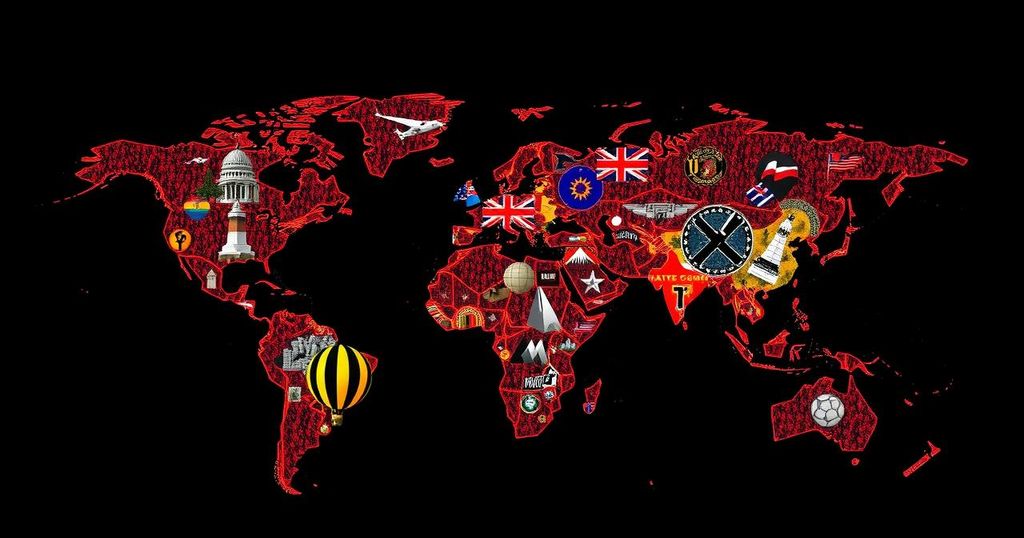Overview of Current International Developments and Trends
This article highlights the latest international news, including China’s economic slowdown, UN warnings on sand storms, US responses to China’s industrial overcapacity, and significant developments across Europe, Asia, and within the media industry. Key events involve the UK’s support for Ukraine at NATO, a trade pact between India and Taiwan, and ongoing tensions in the Middle East, alongside issues in South Sudan and significant changes in global drinking habits.
The current international news landscape showcases a myriad of significant developments across the globe. Notably, China is experiencing a pronounced economic downturn, as expressed by Indian-American Congressman Krishnamoorthi, who emphasized the implications of this slowdown. The United Nations has indicated that the decade from 2025 to 2034 will be critical in addressing the rising incidence of sand storms that transport dust from Africa to China. Furthermore, the United States continues to respond to China’s industrial overcapacity, which is perceived to have considerable global ramifications, as stated by a US official. Secretary of State Antony Blinken highlighted the importance of collaborative efforts between Europe, Asia, and the US to address shared challenges.
In Europe, newly appointed UK Prime Minister, Keir Starmer, reaffirmed his commitment to supporting Ukraine during a NATO summit. Meanwhile, CNN faces a restructuring period, eliminating approximately 100 jobs due to ongoing challenges in audience engagement and revenue generation within the media industry. In finance, Citigroup faced a hefty fine of $136 million for regulatory oversights relating to data management.
In response to European Union trade regulations, China has initiated a retaliatory investigation concerning electric vehicle export concerns. In a more controversial issue, Elon Musk intends to abstain from the culinary delight ‘omelette’ for one week in light of SpaceX’s adverse impact on local wildlife.
The global alcohol market is witnessing a marked shift, with spirits projected to surpass wine in popularity, attributed to evolving consumer preferences. In geopolitical occurrences, peace talks in South Sudan are on the brink of collapse ahead of its initial electoral process.
Additionally, India and Taiwan have launched a trade agreement to facilitate the exchange of agricultural goods, while an incident involving a deported student in the UAE underscores the tensions surrounding the Israel-Palestine conflict. A new UN report has shed light on the Taliban’s oppressive regime, particularly targeting the rights of women and girls. Meanwhile, Saudi Aramco successfully raised $12.35 billion through a recent share sale, demonstrating robust market interest.
Furthermore, the newly appointed US envoy to Taiwan committed to enhancing defensive capabilities amid escalating threats from China. Russia’s highest civil honor, the Order of Saint Andrew the Apostle, was previously awarded to Indian Prime Minister Modi in recognition of his efforts in fostering India-Russia relations. As World Population Day approaches, society reflects on its implications, alongside ongoing political discourse with former President Trump challenging President Biden to further debates. Finally, UK Prime Minister Starmer asserted Ukraine’s right to employ UK-provided missiles in its defense strategy against Russia.
The global political landscape is currently influenced by numerous factors including economic challenges, international relations, and humanitarian issues. Notably, as countries confront the impacts of climate change, economic sanctions, and geopolitical tensions, their responses to such challenges shape future interactions among nations. Significant events such as the economic slowdown in China, regulatory developments in the US, and escalating tensions in South Sudan highlight the intricate balance of domestic policies and international diplomacy. The changing dynamics in the global market, such as the shift in consumer preferences, stress the need for adaptability in various sectors, from agriculture to media.
The interplay of global events exemplifies the complex nature of international relations and economic circumstances. From China’s economic struggles to the evolving diplomatic stances of various nations, it is clear that collaborative efforts will be essential in addressing shared challenges and fostering global stability. The actions taken by key players will significantly influence the geopolitical landscape and the socio-economic fabric of nations around the world.
Original Source: www.business-standard.com




Post Comment